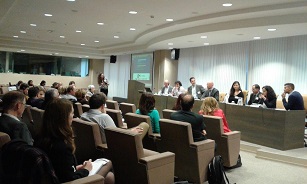VET 4 Interclutural Mediation Project: Closing Conference in Brussels
 The closing conference of the VET4 Mediation with Roma Project, which the Provincial Protector of Ctizens - ombudsman (PPCO) has been supporting for the last two years, was held last Tuesday at the seat of the Belgian Ministry of Employment in Brussels. This international project has been implemented in five European countries with an aim to promote mediation in local communities with significant proportion of Roma population, as well as to build the capacities of women and men mediators by means of training and facilitating their engagement in their local communities.
The closing conference of the VET4 Mediation with Roma Project, which the Provincial Protector of Ctizens - ombudsman (PPCO) has been supporting for the last two years, was held last Tuesday at the seat of the Belgian Ministry of Employment in Brussels. This international project has been implemented in five European countries with an aim to promote mediation in local communities with significant proportion of Roma population, as well as to build the capacities of women and men mediators by means of training and facilitating their engagement in their local communities.
The participants from around ten European countries had a chance to learn about the Belgian experience concerning Roma inclusion and integration by using community mediation. In their introductory speeches these topics were presented by, amongst others, Philippe Courard, President of the French Community Parliament in Belgium, Valeria Atzori drom the European Social and Economic Commitee, Laetitia Gigot from the Wallon Ministry of Welfare, along with two representatives of civil society organizations (CSOs): Kim Janssens from the Minderheiden Forum and Ahmed Akhim from the Roma and Travellers Mediation Centre in Wallonia.
After the presentation of the VET4 Mediation with Roma Project Consortium partners had presented its results and activities implemented in Belgium, Italy, Romania, Serbia and Spain, it was the turn of Maria Grapin, the Romanian MP with the Eruopean Parliament and a member of its Social Development group. The last conference session was dedicated to the experiences of the project trainees, Roma mediators, as well as that of the activists of Belgian and French CSOs working in intercultural mediation field for years back.
The conference was concluded by Jan Jarab from the UN Office of the High Commissioner for Human Rights. He supported the efforts of the VET4 Mediation with Roma Project and other similar initiatives to foster mediation between vulnerable social groups and authorities in a way that would provide for affirmation of the so-called natural mediators from marginalized social groups as competent experts in establishing, maintaining and developing communication between those communities and the institutions.





